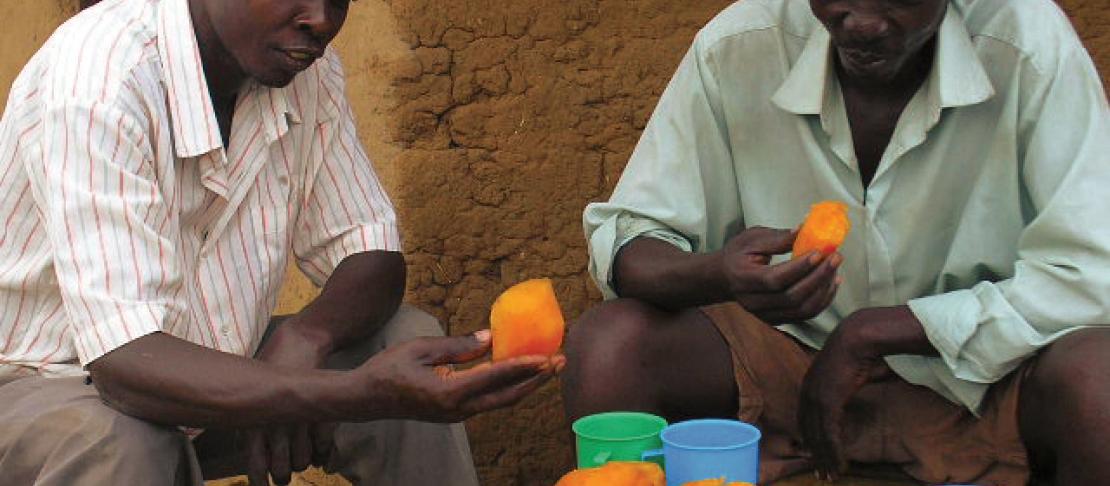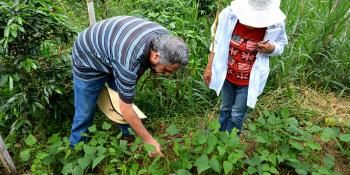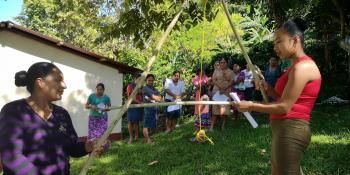A 10-year US $50 million programme focused on crop wild relative collection and pre-breeding for climate change adaptation.

Summary
CCAFS research demonstrated the threats posed to crop wild relatives by climate change and habitat conversion. Analyses showed the very poor conservation status of these gene pools. Based on this work, the Global Crop Diversity Trust made crop wild relative collecting a high priority activity. Thereafter, the Norwegian Government funded the Global Crop Diversity Trust and the Millennium Seed Bank Partnership, Kew, to establish the 10-year USD 50 million ‘Adapting agriculture to climate change: collecting, protecting and preparing crop wild relatives’ project focused on crop wild relative collection and pre-breeding for climate change adaptation. Strategic planning research for collecting activities was led by scientists from the International Center for Tropical Agriculture (CIAT) in collaboration with the University of Birmingham. Regular discussions with the Global Crop Diversity Trust were fundamental in the prioritizing and design of the programme. The project aims to collect the wild relatives of 29 key crops, conserve the specimens in gene-banks, and prepare them for use in plant breeding programmes in time to breed new crop varieties adapted to new climates. The project commenced in 2011, and CIAT continues to provide support in defining priorities.
Key facts
CCAFS research demonstrated the threats posed to crop wild relatives by climate change and habitat conversion.
Analyses showcased the very poor conservation status of these crop wild relative gene pools.
The ‘Adapting agriculture to climate change: collecting, protecting and preparing crop wild relatives’ project aims to collect, conserve, and breed with the wild relatives of 29 key crops over a 10 year period in order to enhance food security through climate change adaptation.
Lessons: key elements of success
Partnership with a key institution was critical to success, in this particular case with the Global Crop Diversity Trust.
Related research outputs
Cadima, X., van Zonneveld, M., Scheldeman, X., Castaneda, N., Patino, F., Beltran, M., & Van Damme, P. (2014). Endemic wild potato (Solanum spp.) biodiversity status in Bolivia: Reasons for conservation concerns. Journal for Nature Conservation, 22(2), 113-131.
Castañeda, N.P., Vincent, H.A., Kell, S.P., Eastwood, R.J., Maxted, N. (2012). Chapter 14: Ecogeographic surveys. Collecting plant genetic diversity: technical guidelines- 2011 update. pp. 1-23.
Dempewolf, H., Eastwood, R. J., Guarino, L., Khoury, C. K., Muller, J. V., & Toll, J. (2014). Adapting Agriculture to Climate Change: A Global Initiative to Collect, Conserve, and Use Crop Wild Relatives. Agroecology and Sustainable Food Systems, 38(4), 369-377.
Gibbs, J. P., Hunter, M. L., & Sterling, E. J. (2008). Climate Envelope Modeling: Inferring the Ranges of Species to Facilitate Biological Exploration, Conservation Planning, and Threat Analysis. Problem-Solving in Conservation Biology and Wildlife Management, 244-254.
Hunter, D., Guarino, L., Khoury, C., Dempewolf, H. (2011). A community divided: lessons from the conservation of crop wild relatives around the world. In: Maxted, N., Dulloo, E., Ford-Lloyd, B., Frese, L., Iriondo, J., (eds.). Agrobiodiversity Conservation: Securing the diversity of Crop Wild Relatives and Landraces. CAB International, Wallingford, UK, 392 pp.
Jarvis, A., Lane, A., & Hijmans, R. J. (2008). The effect of climate change on crop wild relatives. Agriculture, ecosystems & environment, 126(1), 13-23.
Khoury, C. K., Bjorkman, A. D., Dempewolf, H., Ramirez-Villegas, J., Guarino, L., Jarvis, A., Rieseberg, L.H., Struik, P. C. (2014). Increasing homogeneity in global food supplies and the implications for food security. Proceedings of the National Academy of Sciences of the United States of America, 111(11), 4001-4006.
Khoury, C. K., Greene, S., Wiersema, J., Maxted, N., Jarvis, A., & Struik, P. C. (2013). An Inventory of Crop Wild Relatives of the United States. Crop Science, 53(4), 1496-1508.
Maxted, N., Kell, S., Toledo, Á., Dulloo, E., Heywood, V., Hodgkin, T., Hunter, D., Guarino, L., Jarvis, A., Ford-Lloyd, B. (2010). A global approach to crop wild relative conservation: securing the gene pool for food and agriculture. Kew Bulletin, 65(4), 561-576.
Ramirez-Villegas, J., & Khoury, C. K. (2013). Reconciling approaches to climate change adaptation for Colombian agriculture. Climatic Change, 119(3-4), 575-583.
van Zonneveld, M., Jarvis, A., Dvorak, W., Lema, G., & Leibing, C. (2009). Climate change impact predictions on Pinus patula and Pinus tecunumanii populations in Mexico and Central America. Forest Ecology and Management, 257(7), 1566-1576.
Vincent, H., Wiersema, J., Kell, S., Fielder, H., Dobbie, S., Castaneda-Alvarez, N. P., Maxted, N. (2013). A prioritized crop wild relative inventory to help underpin global food security. Biological Conservation, 167, 265-275.


